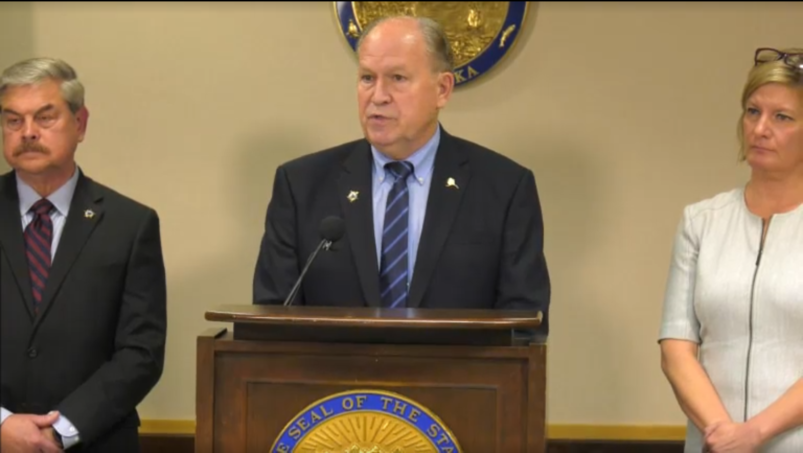
From the Atwood Building in Anchorage, Gov. Bill Walker’s administration announced Monday its support for tougher penalties for drug and sex crimes. It also plans to boost support for public safety in villages and schools.
Walker plans to propose a bill to increase penalties against adults who sexually abuse minors six or more years younger than them. And he would require everyone registered as a sex offender in other states to register in Alaska. Attorney General Jahna Lindemuth said some offenders moving from other states didn’t have to register.
“We get into an argument about matching up elements in Alaska’s law with elements of crimes in other jurisdictions,” Lindemuth said. “We need to stop that. If you have to register in another state, you have to register here.”
The administration also wants a law to make trafficking the deadly opioid fentanyl a class A felony. Depending on the offender’s criminal history, that could lead to sentences of up to 20 years.
Lindemuth said reducing drug use is important to lowering crime.
“Now, there are many causes to crime, but the increase in our crime rate is strongly correlated to our opioid epidemic,” Lindemuth said.
The Alaska State Defense Force is the volunteer organization that is part of the state’s militia. The administration wants to increase these volunteers’ training, with the aim of improving public safety in villages. Adjutant General Laurie Hummel described what the state plans to do.
“The training for our defense force members there will include things like emergency incident command system, suicide and violence prevention, first aid, health and wellness, water safety, as well as traditional scout and field-craft skills,” Hummel said.
Village residents on probation could also check in with these volunteers in areas without probation officers.
Another bill would establish a crisis chat and tip line to provide students a way to inform school staff about potential violence. And the administration would seek another law to create a panel to review overdose deaths and develop methods to prevent them.
Walker, who’s an independent, said these public safety proposals are separate from his campaign for governor.
“It’s a very, very high priority, so we don’t stand that down and say we’re not going to address public safety because it’s an election cycle,” Walker said. “We just don’t.”
Republican candidate Mike Dunleavy, a former state senator, said in an emailed statement that he would repeal all of the 2016 law that overhauled criminal justice, known as Senate Bill 91.
“State government has no higher priority than protecting life and property,” Dunleavy said. “As governor, I will make public safety the number one priority of my administration on day one, not 30 days before re-election. I will ensure that police, prosecutors and our courts have the resources they need to effectively fight crime.”
Democratic candidate Mark Begich, a former U.S. senator, said both Walker and Dunleavy haven’t done enough to reduce crime.
“It’s four years and we’ve gotten worse,” Begich said. “And it is time that we get serious about crime, quit talking about it and do something. And my experience as mayor (of Anchorage) is that’s exactly what you have to do. You sit around and have more study groups, more task force, more conversation, crime only gets worse.”
Begich also said he would repeal Senate Bill 91. He said he would replace it with a comprehensive plan.
At the announcement, Public Safety Commissioner Walt Monegan cautioned against moving backward.
“I’ve been a police officer for a long, long time,” Monegan said. “And I can tell you what we doing before SB 91 really wasn’t working. We were filling up jails, we were seeing recidivism: arresting, re-arresting.”
Senate Bill 91 was aimed at reducing repeat offenses. Crime statistics show that state crime rates had started rising before the law and have continued to increase as the opioid epidemic has raged.
Andrew Kitchenman is the state government and politics reporter for Alaska Public Media and KTOO in Juneau. Reach him at akitchenman@alaskapublic.org.




